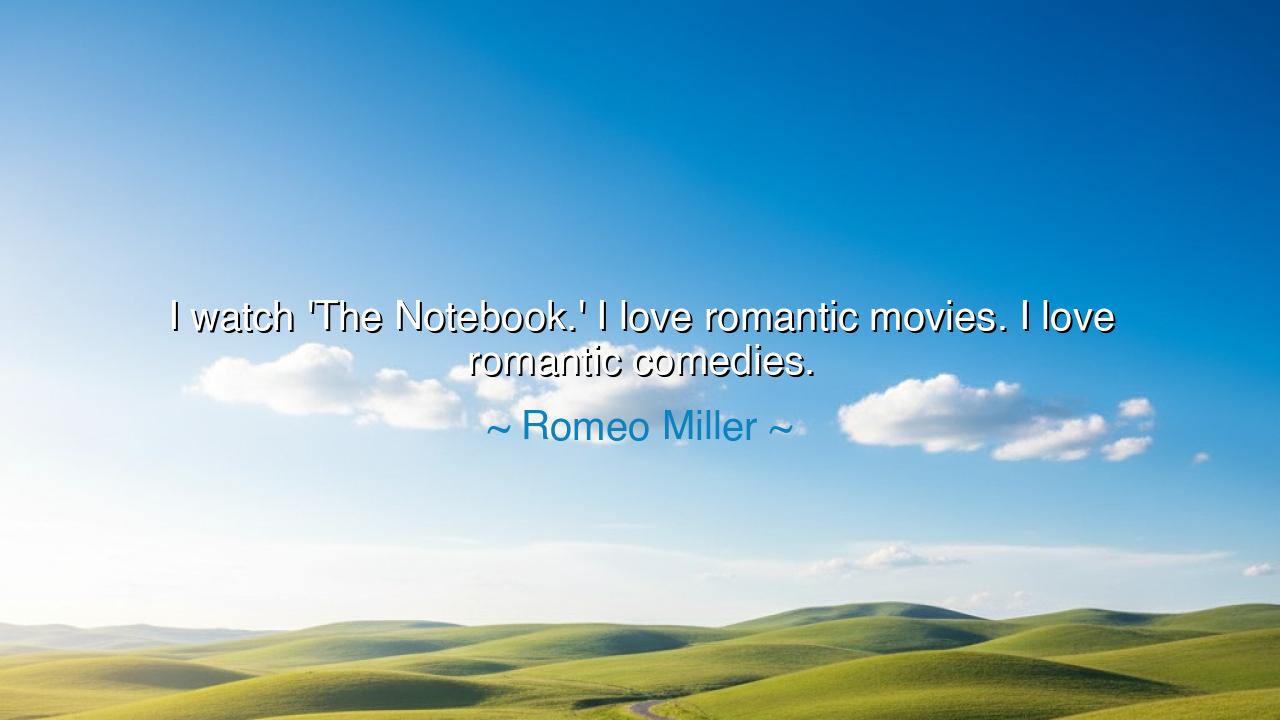
I watch 'The Notebook.' I love romantic movies. I love romantic






"I watch 'The Notebook.' I love romantic movies. I love romantic comedies." These words from Romeo Miller speak to the timeless nature of romantic storytelling—a genre that transcends centuries and cultures, deeply embedded in the fabric of human experience. Romantic movies, much like the ancient tales of gods and mortals, have the power to stir the heart, to evoke a deep sense of longing, desire, and connection. For Miller, as for many, the allure of these films lies not just in their ability to entertain, but in their capacity to make us feel, to bring us closer to the core of what it means to love and be loved. In a world that often moves too quickly, these stories offer a moment of pause, a space to reflect on the deep emotion and sacrifice that true love requires.
In the ancient world, love was often portrayed as a force that could conquer not just hearts, but entire empires. Homer’s Iliad, for example, is filled with tales of love that intertwine with warfare, betrayal, and sacrifice. The love between Paris and Helen of Troy set the stage for the downfall of a city, yet even in the midst of their tragic love story, we find a powerful reflection of the complexities of desire. Helen’s love for Paris was both personal and political, and their story, though tragic, embodies the sacrifices that often come with love. Much like the romance in "The Notebook", it is not just the passion, but the obstacles and the sacrifices that make the love so poignant. The ancient Greeks understood that love, in its purest form, is not just a feeling, but a force that shapes destinies.
Romantic comedies, much like the love stories of old, often explore the longing and persistence that are the essence of true connection. Romeo Miller’s affinity for these films speaks to the universal truth that we all crave the simple, pure connection between two souls—one that is filled with humor, lightness, and shared moments of joy. Take, for example, the legendary love stories of Romeo and Juliet, whose love, though doomed by circumstance, was marked by its intensity and its youthful passion. The romantic comedy, in a way, mirrors the youthful exuberance of their love—full of humor, charm, and the belief that love can overcome all. It is in this belief, in the power of love to conquer even the most difficult of circumstances, that romantic comedies find their heart.
The romantic comedy, in its essence, invites us to experience love as something light and transformative, much like the playful love that graced the comedies of Shakespeare. Plays like "Much Ado About Nothing" and "Twelfth Night" are filled with wit, misunderstanding, and misdirection, yet at their core, they are love stories. These comedies show us that love is not always serious and profound; it can also be lighthearted, humorous, and full of joy. The beauty of a romantic comedy lies in its ability to combine the complexities of love with the humor and joy that love often brings. Miller’s affection for these films reflects the deep human desire to see love as both playful and profound, to embrace its lightness without losing sight of its depth.
The lesson from Romeo Miller’s words is clear: love, in all its forms, is both simple and complex. It can be tragic, as in the case of Paris and Helen, or playful, as in the case of a lighthearted romantic comedy. But in all its iterations, love is a powerful force that shapes our lives. Romantic movies and comedies remind us that love does not always have to be heavy or burdensome; it can be joyful, transformative, and sometimes even funny. In our own lives, we must seek to embrace both the lightness and the depth of love, understanding that true connection can be both profound and playful.
Consider the example of Cleopatra and Julius Caesar, whose love was far from comedic, yet filled with its own unique kind of romantic intensity. Though their love story was entwined with the fate of nations, it still carried the exuberance and passion that we see in the love stories of the silver screen. They were not just rulers and conquerors, but two individuals drawn together by a force stronger than themselves. Their story, like many of the romantic tales we adore in films, is one that continues to captivate our hearts, reminding us that love, no matter the setting, always carries the same core truth—it is an unyielding force that shapes and reshapes everything it touches.
So, to those who will follow, remember this: love is both a grand and a simple thing. Whether it is the tragic love of ancient heroes, the playful love of a romantic comedy, or the intense passion of lovers who change the world, love is a force that defines us all. Do not be afraid to embrace the joys and complexities of love, whether in the form of a lighthearted movie or in the deepest moments of connection with another. In doing so, you will find that love, in all its forms, is the most powerful force in the world. Cherish it, laugh with it, and let it shape your heart.






AAdministratorAdministrator
Welcome, honored guests. Please leave a comment, we will respond soon